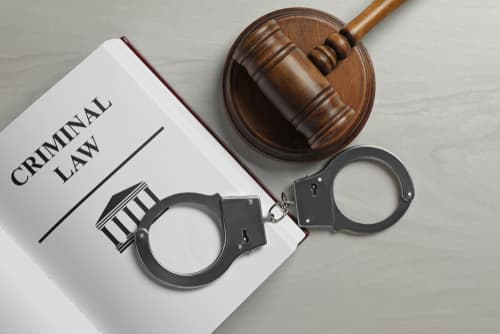Criminal charges for offenses like DUI or drug possession carry serious penalties that can alter your life. When facing these circumstances, you need a defense attorney who will protect your rights.
Before hiring an attorney, ask critical questions about their experience with cases like yours, their strategic approach to defense, who will handle your case, and how they structure their fees.
An effective attorney analyzes the prosecution's case, manages all legal paperwork and deadlines, communicates with the court and prosecutors, and builds a strong defense. They guide you through negotiations or trial, ensuring you understand your options as they work to achieve a favorable outcome.
Most Common Types of Criminal Offenses
Individuals can face many different types of criminal charges, but some of the most common include DUI (driving under the influence) and drug offenses. These charges can range from misdemeanors to serious felonies, depending on the facts of the case and the person’s criminal history.

DUI charges are among the most frequently filed in criminal court. A standard DUI charge usually involves operating a motor vehicle while under the influence of alcohol or drugs. However, there are different types of DUI charges. A person can be charged with a DUI if their blood alcohol concentration (BAC) is 0.08 percent or higher. Some states also have stricter rules for commercial drivers or drivers under 21. Aggravated or felony DUI charges can apply if the driver caused an accident, had prior DUI convictions, or had a child in the vehicle at the time.
Drug charges are also common and can include possession, distribution, manufacturing, or trafficking of illegal substances. The seriousness of a drug charge often depends on the type and amount of drug involved. For example, possessing a small amount of marijuana may result in a misdemeanor, while trafficking heroin or fentanyl can lead to serious felony charges and lengthy prison sentences.
These charges can carry harsh penalties upon conviction, especially if the accused has a prior criminal record.
In every criminal case, the burden of proof lies with the prosecution. It means that the government must prove, beyond a reasonable doubt, that the accused committed the crime. This is the highest legal standard in the justice system. The accused person, also known as the defendant, is presumed innocent until proven guilty. They are not required to prove their innocence or present any evidence, although they may choose to do so through their defense attorney. This presumption of innocence is a fundamental right and protects individuals from being wrongfully convicted without strong and convincing evidence.
Why You Need a Criminal Defense Attorney in Your Case
Facing criminal charges is a serious matter that can impact your future in many ways. Whether you are accused of a misdemeanor or a felony, the consequences can include jail time, heavy fines, a criminal record, and damage to your personal and professional life. For these reasons, having a skilled criminal defense attorney is extremely important.
- One of the most important reasons to have a skilled attorney is that the criminal justice system is complicated and challenging to understand. Strict rules, legal procedures, and deadlines must be followed. If you make a mistake or miss a step, it can hurt your case. A skilled attorney knows how the system works and how to navigate it correctly, giving you the best chance of protecting your rights.
- Another reason is that your freedom and reputation are at stake. A criminal conviction can result in time behind bars, loss of employment, loss of a professional license, or a permanent criminal record. Even if you avoid jail, having a conviction can follow you for the rest of your life and limit your opportunities. That’s why it’s critical to approach your case with the seriousness it deserves.
- The stress and pressure of a criminal case can also be overwhelming. People who face charges often experience fear, confusion, and uncertainty about the future. A knowledgeable attorney can give you the support and confidence to stay focused and calm throughout the process. While emotions may run high, having someone on your side who understands the situation and can guide you through it with a clear perspective is important.
- Finally, there are long-term consequences of a criminal case that you might not think about right away. These can include trouble finding housing, losing child custody rights, or being denied financial aid or loans. These outcomes can affect not only you but also your family.
A skilled criminal defense attorney is important because your case can impact every part of your life for years to come. Making smart decisions early on can help protect your future and give you a chance to move forward with your life.
What are the Most Important Questions to Ask an Attorney
Hiring a criminal defense attorney is one of the most important decisions you will make if you are facing criminal charges. Not all lawyers are the same, and choosing the right one can make a big difference in the outcome of your case. To make an informed decision, you should ask the right questions before hiring anyone to represent you.
One of the most important questions to ask is, “How much experience do you have with criminal cases like mine?” You want an attorney familiar with similar cases, whether it involves DUI, drug charges, or other crimes. Their experience can help you feel more confident that they know what they’re doing.

Another key question is, “What is your track record with cases like mine?” It means asking how often they’ve handled cases that resulted in dismissals, reduced charges, or not-guilty verdicts. While no attorney can guarantee a specific outcome, their past success can give you an idea of how well they handle criminal cases.
You should also ask, “Will you be the one handling my case?” Some law firms assign cases to junior lawyers or legal assistants, even if you meet with a senior attorney during your first visit. Make sure you know who will be representing you in court.
It’s also important to ask, “What are your fees, and what do they include?” Understanding the cost of representation can help avoid surprise expenses later. Find out whether the attorney charges a flat fee, hourly rate, or requires a retainer. You should also ask if the fee covers trial preparation, court appearances, and other legal services.
Another helpful question is, “What is your approach to defending a case like mine?” Every attorney has a different strategy. Some prefer negotiating plea deals, while others are more aggressive about going to trial. You should feel comfortable with their approach and confident in their ability to represent you.
Lastly, ask, “What are the possible outcomes in my case?” A good attorney will give you an honest, realistic assessment based on the facts, even if it’s not what you want to hear. Asking these questions will help you find a knowledgeable, trustworthy lawyer who can guide you through the criminal justice process.
How Can a Criminal Defense Attorney Handle Your Case?
A skilled criminal defense attorney is invaluable in managing many challenging aspects of your case. From the moment you are charged until the case is resolved, they handle tasks that can be confusing and overwhelming for someone without legal training. Their legal knowledge and experience help protect your rights and can influence the outcome of your case.
One major way an attorney helps is by investigating the facts of your case. They review police reports, witness statements, and physical evidence to understand exactly what happened. Sometimes, they even hire experts to analyze evidence or find mistakes made by law enforcement. This detailed investigation is key because it can uncover weaknesses in the prosecution’s case or demonstrate your innocence.
Another important aspect is dealing with paperwork and deadlines. Criminal cases involve many legal documents that must be filed on time. Missing a deadline or filling out forms incorrectly can harm your case. A skilled attorney knows the rules and ensures all paperwork is completed and submitted correctly.
A criminal defense attorney communicates with the prosecutor and the court on your behalf. They negotiate for better terms, such as reduced charges or alternative sentencing. They handle scheduling court dates and ensure you understand what is happening at every stage. This support reduces your stress and keeps you informed.
If your case goes to trial, the attorney will prepare your defense. They gather evidence, plan arguments, and may call witnesses to support your side. They speak for you during the trial and challenge the prosecution’s evidence. Their goal is to create reasonable doubt in the minds of the judge or jury.
Beyond court appearances, attorneys advise you on what to do and say throughout your case. They help avoid actions or statements that can be used against you. This guidance is pivotal because even a small mistake can have serious consequences.
A skilled criminal defense attorney handles complex tasks, protects your rights, and guides you through the legal system. Their involvement can significantly affect how your case is resolved and help achieve the best possible outcome.
Plea Deal Versus Trial in a Criminal Case
Once charges are filed in a criminal case, the accused generally has two main options for resolving the matter: accepting a plea deal or going to trial. Both choices have significant consequences, and understanding their differences is important. A skilled criminal defense lawyer will guide you through this process and help you make the best decision based on your unique situation.
A plea deal, also called a plea bargain, is an agreement between the defense and the prosecution. Instead of going to trial, you agree to plead guilty to a lesser charge or accept a lighter sentence. Prosecutors often offer plea deals to resolve cases quickly and avoid the time and expense of a trial. For defendants, plea deals can reduce penalties, such as shorter jail time or smaller fines. However, accepting a plea means admitting guilt, which results in a criminal record.
On the other hand, a trial is a formal legal process where the prosecution must prove your guilt beyond a reasonable doubt. During a trial, evidence is presented, witnesses testify, and both sides make arguments. A judge or jury then decides whether you are guilty or not guilty. Trials can be risky because if you are found guilty, penalties might be more severe than what a plea deal offers. However, a trial also gives you the chance to fully defend yourself and possibly be acquitted.
A skilled criminal defense attorney carefully evaluates your case and advises you on whether a plea deal or trial is the better option. They analyze the strength of the evidence, your criminal history, and potential penalties. If a plea deal is available, the attorney negotiates with the prosecutor to secure the best possible terms. This negotiation requires experience to avoid accepting a deal that is too harsh or missing an opportunity for a better outcome.
If going to trial is the best choice, your attorney prepares a strong defense strategy, gathers evidence, and represents you in court. They ensure that your rights are protected throughout the trial process. Whether you accept a plea deal or go to trial, a skilled criminal defense lawyer is vital. They handle the complex legal work, communicate with prosecutors and the court, and support you in making informed decisions during stressful times.
Questions About Criminal Defense Cases
What should I do immediately after an arrest?
Politely decline to answer any questions from law enforcement and state that you wish to speak with an attorney. You have a right to remain silent and a right to legal counsel. Invoking these rights cannot be used against you. Avoid discussing your case with anyone other than your lawyer.
Can I change lawyers if I am unhappy with my current one?
Yes, you have the right to change your attorney at any time. However, consider the timing.
Changing lawyers shortly before a trial may cause delays and might require the court's permission. If you decide to switch, you should formally notify your current attorney in writing and arrange to have your case file transferred to your new counsel.
What is the difference between a misdemeanor and a felony?
Misdemeanors are less serious crimes than felonies.
Generally, the maximum punishment for a misdemeanor is up to one year in a local jail.
Felonies carry a potential punishment of more than one year in a state or federal prison. The classification of a crime as a misdemeanor or felony depends on state or federal law.
Contact an Experienced Criminal Defense Lawyer Right Away

You have no time to lose if you are currently facing a criminal charge. A knowledgeable criminal defense attorney can review the charge against you and review potential legal options. They can also handle every aspect of your criminal case, from negotiating with prosecutors to taking your case to trial, if necessary. They will do everything possible to secure the best possible result for you. Make the call today and get a skilled professional on your side.